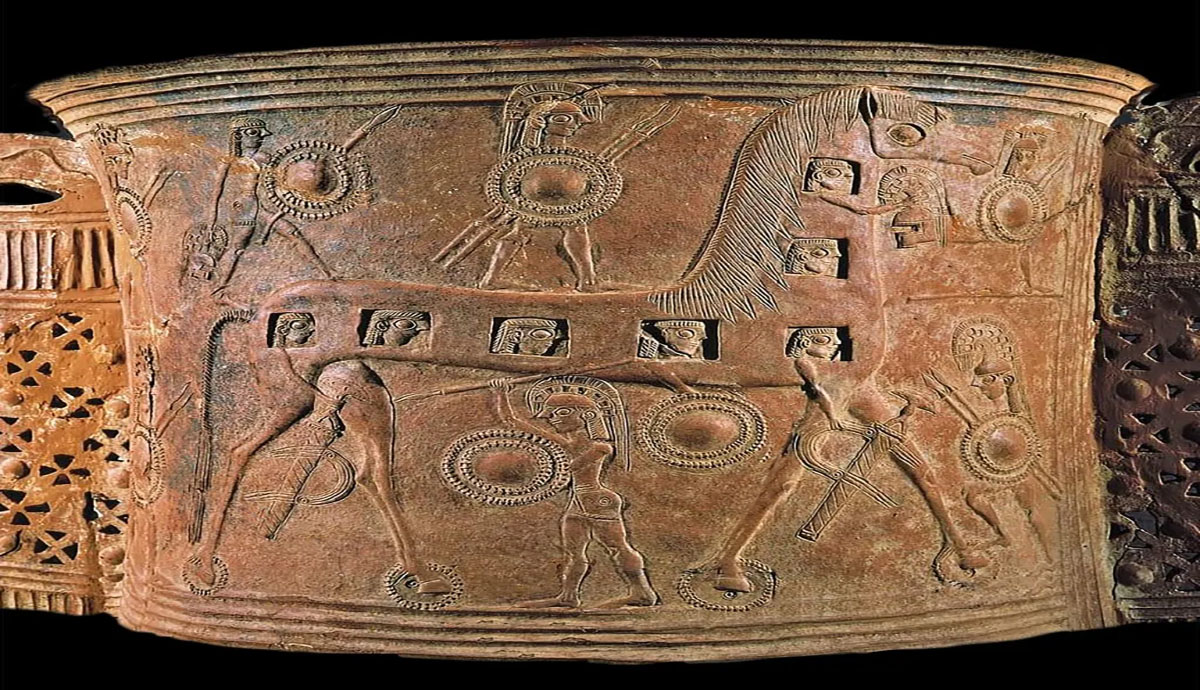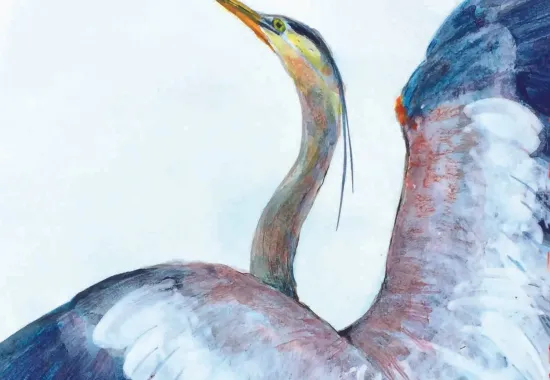Review of “To Sleep in the Horse’s Belly” by George Kalamaras
George Kalamaras has proved to be a formidable and unique presence in English-language North American poetry, starting from the 1990s to the present day. His work first grabbed the readers’ gaze with such collections as Even the Java Sparrows Call Your Hair and Kingdom of Throat-Stuck Luck. The reader familiar with the electric excursions into surrealism by North American poets like Gene Frumkin and Philip Lamantia quickly realized a new voice had emerged, one that twisted sense and syntax, made wild metaphoric leaps, and tapped his energy from the best of Latin American poetry, European poetry in the vein of Desnos and others, as well as classical and modern Greek poets. Classical and modern Greek poets, perhaps emphatically so. Ethnically Greek (three of his four grandparents emigrated to the United States), Kalamaras was speaking with more than one voice (as do so many wonderful poets). The poems that he crafted formed a bouquet of such striking juxtapositions as: “Examine my hands, on which you’ll see the staph infections of eels. / Rust spots below my eyes suggest the guise of an underwater guitar.” Or: “The shoes of my mouth walk off with my tongue / The shoes of my tongue walk off with my mouth / […] The shoes of my saliva lubricate my brain.” The reader knew a bonfire was blazing on the horizon.
And now Kalamaras has just published To Sleep in the Horse’s Belly: My Greek Poets and the Aegean Inside Me, published by the wonderful Dos Madres Press. As the title suggests, this book is a homage to poets in the Greek language, an exploration of his family and ethnicity, and a map of the voices in Greek verse, from the Homeric to the Contemporary. Greek poetry may seem to be widely read in North America, yet the poets are often limited to the triumvirate of Ritsos, Elytis, Seferis. Nothing wrong with Ritsos (he’s a genius)—and a two-page prose poem informing us of how Ritsos “used to sleep with tiny lemon wedges between his toes” appears early in this collection—but the repetition of the names reminds some enthusiasts of Latin American poetry who roll their eyes when hearing the roll call: Neruda, Paz, Vallejo. What about a bit of Carlos Martínez Rivas, Eunice Odio, or Rodolfo Hinostroza? Kalamaras is now opening a new treasure chest of voices from the Greek canon, as well as marginalized voices: Nikos Engonopoulos, Angelos Sikelianos, George Themelis, and Dinos Siotis, among others (and “The Death of Konstandinos Karyotakis Reborn in the Birth-Blood Poems of Dinos Siotis” is one of the most exciting poems in this new collection).
Kalamaras has absorbed Greek poetry so that his verse strikes this reader as consanguineous with Greek poets and their language, especially those who harvested imagery and leaps of syntax and metaphors from surrealism. In fact, there is a radiant residue of Greek heard from childhood, from the words of family, evident in these poems, as well as an incorporation of Greek poetry in translation, so that the English poems read as translation from a Greek original at times. Kalamaras has a delightfully off-minor ear, a grasp at syntax and line-juxtapositions that jar and dazzle the reader, in the same manner that Thelonious Monk strikes a chord at the unexpected instant, and then lets slide an arpeggio in a whole-tone scale. The anaphora in “Nanos Valaoritis Considers Trouble in the Tree of Life” proves less redolent of Ginsberg, than voices in twentieth-century Greek poetry. The mere title of book three in this excellent collection (The Way Wolves Eat History When History Eats Its Young) seethes with this odd magic, sounding completely different from anything growing stale in mainstream American verse (I am thinking of Billy Collins, Carl Dennis, and the other usual suspects).
The poems veer back and forth between family experiences, as well as various steps in Greek experience, history, and culture. One of the collection’s strongest poems, “Bucephalus, Belovèd Horse of Alexander the Great,” commences with: “To sleep. Soundly. Asleep. / To sleep in the horse’s belly.” What follows is the poet addressing the horse, returning to his grandfather’s presence at the kitchen table, gifting us with the image of his belovèd elder who let him “sip his retsina.” The stories his grandfather wove make the narrator-as-a-boy weep, as he yearns to “ride” the horse, as well as its “shadow.” The words of his pater familia and the potent phanopoeia they cast transform the young Kalamaras into a communicant with Alexander, the ancient marble, and a myriad of voices and vistas. He concludes the poem with what could be curated as a microcosm of the collection’s raison d’etre:
As I entered the realm of being Greek. Feeling my clumsy
human body grow into something tender yet strong enough to
stand the burning sand. To absorb the dark marks I stared into
the sun. To carry phalanxes and generals miles in my wake,
within me, into the then-unknown blur of men that this boy,
freshly human, was about to become.
This ingestion of Greek language, culture, and poetry, and its transubstantiation into English reminds the reader of the best of Chicano poetry, where the strophes are not merely a pastiche of commonplace nouns and clichéd code-switching. In the strongest of Latinx-American verse, one senses that such poets as Juan Felipe Herrera or Ray Gonzalez were grafting the Latin American tradition and the algebra and fire of Sabines, Neruda, or Paz, into a personalized English, yet all the more stimulating to read as a result. (A quick read through Cabato Sentora by Gonzalez, or the suite of poems by Herrera in the Gonzalez-edited anthology, After Aztlan: Latino Poets in the Nineties, might convince many.) Among other North American poets who have created their own lexicon from gathering the energy from unusual sources, one should also mention Will Alexander (in his case, Francophone Surrealism and African verse from René Depestre and Jean-Joseph Rabearivelo). Thus, it is no surprise that George Kalamaras is often mentioned in the same breath when one discusses Andrew Joron, Will Alexander, or Ray Gonzalez. If anything, we are witnessing the creation of a generation of poets who will leave a strikingly chthonic and foreign contribution to North American poetry.
The imagination in this book urges the reader to take into consideration Clayton Eshleman’s riff on the word “imagination” itself. With the late poet-translator, it alchemizes into Image, Magic, Magician, Mage, Magi … a true “abysscadraba.” This wizard of a poet, George Kalamaras, unveils a poem in which we hear what Paul Éluard heard at the Bureau of Surrealist Research, in “A Reading from the Epistle of Gisèle Prassinos.” The prose poem astoundingly channels the rush and oneiric flow from the best of surrealist works. The embers, the sparks and sudden conflagrations read as: “let your cigarette burn as if a cypress tree in Ephesus on fire […] you felt your woman-body glow and expand in ways only the wind knows. […] My sisters of the wind lifting through the soles of the feet. Go inward. […] Age has no worm. […] Listen to these words. Even as you eat them, they disappear.” Such games—serious life-giving and life-risking games—continue in the following page with Lord Byron (that well-known Philhellene) when he “Discovers the Poetry of César Vallejo Inscribed in the Delphic Stone,” as well as by other fortuitous feats, such as “Aztecs in Greece” and “George Seferis in Fort Wayne, Indiana.”
The final poem unwinds as a fitting “Homage to St. Dionysios.” The reader learns how the Saint “walked across the sea into” his—the speaker-poet’s—chest. Flecks and colorful images of the narrator’s childhood home follow: “relics,” and the information of “Every night I prayed and you answered / Giving me sudden geese in the throat / The wing-beat hollow bones of their music.” The poem rises in intensity, as we are then poured into the frothing estuary of “When I emerged after many lives / Freshly Greek, once again, into this body / From the body of darkness / After a long night of wandering / Through seaweed and storms”; thus, the collection comes full circle from its initial search in “Looking for My Grandfather with Odysseus Elytis” and other poems in the opening pages that yearn for union, for a place in the vast hall of Greek Voices.
In closing, one must also emphasize how To Sleep in the Horse’s Belly: My Greek Poets and the Aegean Inside Me is a book about family, love for family, and for one’s culture, especially when one pertains to a culture different from the Anglo-American mainstream. It is a book clearly written in the lineage of immigrants. The book includes an album of photographs of family, recent arrivals to the North American shore, even an icon of St. George slaying the dragon. The collection also closes with a generous amount of notes and sources with regards to strophes lifted from poems to create the hybrid voices, the radiant heteroglossia in this collection. This melding of the autobiographical and poetry, the voices of poets, and of family members, the way in which Kalamaras “remembers” how he left Greece before his birth and reached the New World, his voyage on the ship, and the “rise and fall of the unsettling / waves that will surely one day settle us into the certain / uncertainty of the world,” comprise a book of love unjaded, sui generis, and of sharing quaffs straight from the kylix of unmixed wine with a gathering of living blood and of the Shades. We will share the vintage until it stains our teeth black, all while we laugh and weep. It is an honor to welcome this collection into that suite of books that are neither this nor that, but a possibility, a door left ajar, another gaze at how to tell and sing. I’m thinking of works by Kenneth Patchen, the wild translations of Paul Blackburn, or the similar ingestion and recreation of Villon rendered by Jean Calais (Stephen Rodefer). This book by Kalamaras, dear folks, is the real thing. I highly encourage you to get it in your hands.
Recommended
A Review of Portable City by Karen Kovacik
A Review of Haircuts for the Dead by William Walsh
A Review of Birdbrains: A Lyrical Guide to the Washington State Birds






